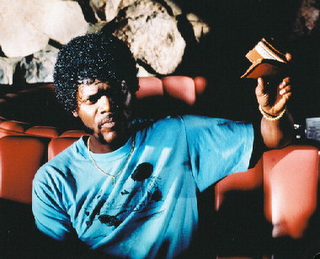All right, guys, we all know Will, (aka “dix” or “wcdixon”), author of uninflected images juxtaposed, funny man, devil’s advocate, rock 'n roller, and slow convert to the art of subtext. He's a father, a teacher, and a filmmaker. He's “starkly gleeful meets darkly sardonic meets sadly simplistic.” He's the little independent guy who's always aspiring to be the summer blockbuster.
He should also be congratulated, as he was just recently hired to write for an existing teen drama TV series. All I’ve got to say is - there better be a lot of subtext on that show. Hehehe…
I will admit, he went through a few scenes before settling on Groundhog Day by Danny Rubin (with revisions by Harold Ramis). There is some subtext here, I think, with Rita’s quotation of Sir Walter Scott. There's also the usual “seduction subtext” as Phil tries so hard to get Rita to sleep with him.
Here are Dix’s thoughts:
There's an old saying that goes "dying is easy, comedy is hard". I would imagine that "dramedy" or comedy with dramatic subtext is even harder. That's probably why I have so much respect for one of the true comedic geniuses of our time, Bill Murray and his best role was as Phil Connors, the weatherman stuck inside Groundhog Day.
The transformation that overcomes Bill Murray's character is mesmerizing. He starts out the film crabby: "You want a prediction about the weather, you're asking the wrong Phil. I'll give you a winter prediction: It's gonna be cold, it's gonna be grey, and it's gonna last you for the rest of your life". As the effect of being stuck in the same day takes hold, he turns alarmed: "Well, what if there is no tomorrow? There wasn't one today!" Realizing that he can use this bizarre twist of fate to do some good, he actually turns into a sweet gentle soul: "When Chekhov saw the long winter, he saw a winter bleak and dark and bereft of hope. Yet we know that winter is just another step in the cycle of life. But standing here among the people of Punxsutawney and basking in the warmth of their hearths and hearts, I couldn't imagine a better fate than a long and lustrous winter."
Phil, though he probably never realized it, was trapped in a life that made him bitter and insensitive. It's only when he is forced to take each day as his last and learn to make full use of that day — to live in the moment — that he achieves a form of self-actualization.
INT. DINER - LATER THAT MORNING
Phil is sitting at his usual table, which is covered with an incredible variety of rich foods— eggs, bacon, sausage, pancakes, pies, cakes, eclairs, ice cream, puddings, etc. Rita sits across from him, watching in amazement as he stuffs himself with pastry.
RITA
Is this some new fad diet? Don't
you worry about cholesterol?
Phil scrapes a plate and takes a final bite of a chocolate eclair.
PHIL
I don't worry about anything
anymore.
RITA
What makes you so special?
Everybody worries about
something.
PHIL
That's exactly what makes me so
special.
He takes a big bite of cake. Rita shakes her head.
PHIL
(with his mouth full)
What?
RITA
"The wretch, concentered all
in self,
Living, shall forfeit fair
renown,
And doubly dying, shall go
down to the vile dust from
whence he sprung,
Unwept, unhonored, and
unsung." Sir Walter Scott.
PHIL
(stares at her for a
long moment)
"There was a young man from
Nantucket—"
RITA
That's really funny. When are
you going to grow up, Phil?
PHIL
At this rate-- never.
(he pulls out a pack of
cigarettes)
Okay if I smoke?
Rita shrugs. Phil lights up a cigarette.
RITA
You really do have a death wish,
don't you?
PHIL
Just the opposite, Rita. I have
a life wish. I'm just trying to
enjoy it. Taking pleasure in the
little things. Don't you ever
just want to cut loose and go
wild?
RITA
I wouldn't even know what it
means to go wild.
PHIL
Yeah, well, that's where I come
in. Going wild is one of my
specialties. Last night I got
completely loaded and drove headon
into a police car.
RITA
(disbelieving)
Oh, really? You look pretty good
this morning.
PHIL
That's my point. I know you
won't believe me, but we could do
anything we want today and it
wouldn't matter one bit.
Absolutely no consequences.
Complete and total freedom.
RITA
And how..,do we manage that?
PHIL
You leave that to me. Why don't
you send Larry back and hang out
with me for the rest of the day?
You never make it through that
blizzard anyway.
Larry enters the diner and spots them.
RITA
I'll take my chances with the
-weather. But you have a good
time.
PHIL
Don't worry. I plan to.
Or maybe this scene...
INT. VESTIBULE – CONTINUOUS
Rita hugs him again and starts to exit.
RITA
Thanks. See you tomorrow.
PHIL
Tomorrow? Wait, aren't you going
to come up to my room for a
while?
RITA
(very reluctant)
I don't know, Phil—
PHIL
No reason to end a perfect day.
RITA
(deciding)
Well— we better not.
PHIL
No, you should. The, uh, the
poetry! I've got some books,
Rimbaud, Beaudelaire, we could
light a fire—
RITA
Thanks, but —
PHIL
(seeing it all slip
away)
Please come, Rita. It'll be —
RITA
(definite)
Phil, I'm tired. We can be
together tomorrow.
PHIL
(getting desperate)
But there is no tomorrow for me!
RITA
(adamant)
Let's not ruin it, Phil. There's
no way I' m sleeping with you
tonight.
PHIL
Why not? Rita, I love you!
RITA
You don't even know me!
PHIL
(grabs her hand)
Please! You have to!
Rita shakes loose from his grasp.
RITA
What's wrong with you!
There is a long moment of silent tension, then all her old doubts about Phil come rushing back.
RITA
(shaking her head)
Oh, no. I can't believe I fell
for it. This whole day was just
one long set-up. And I ate
fudge. Yucchh! I hate fudge.
PHIL
No, it was real. I love you.
RITA
Stop saying that! Do you really
expect me to trust you? The
whole secretarial pool is a Phil
Connors recovery group.
PHIL
But I can change! I really can—
Rita slaps him hard on the cheek.
RITA
That's for making me care about
you.
She turns and stomps off, leaving Phil standing there hurting.


































